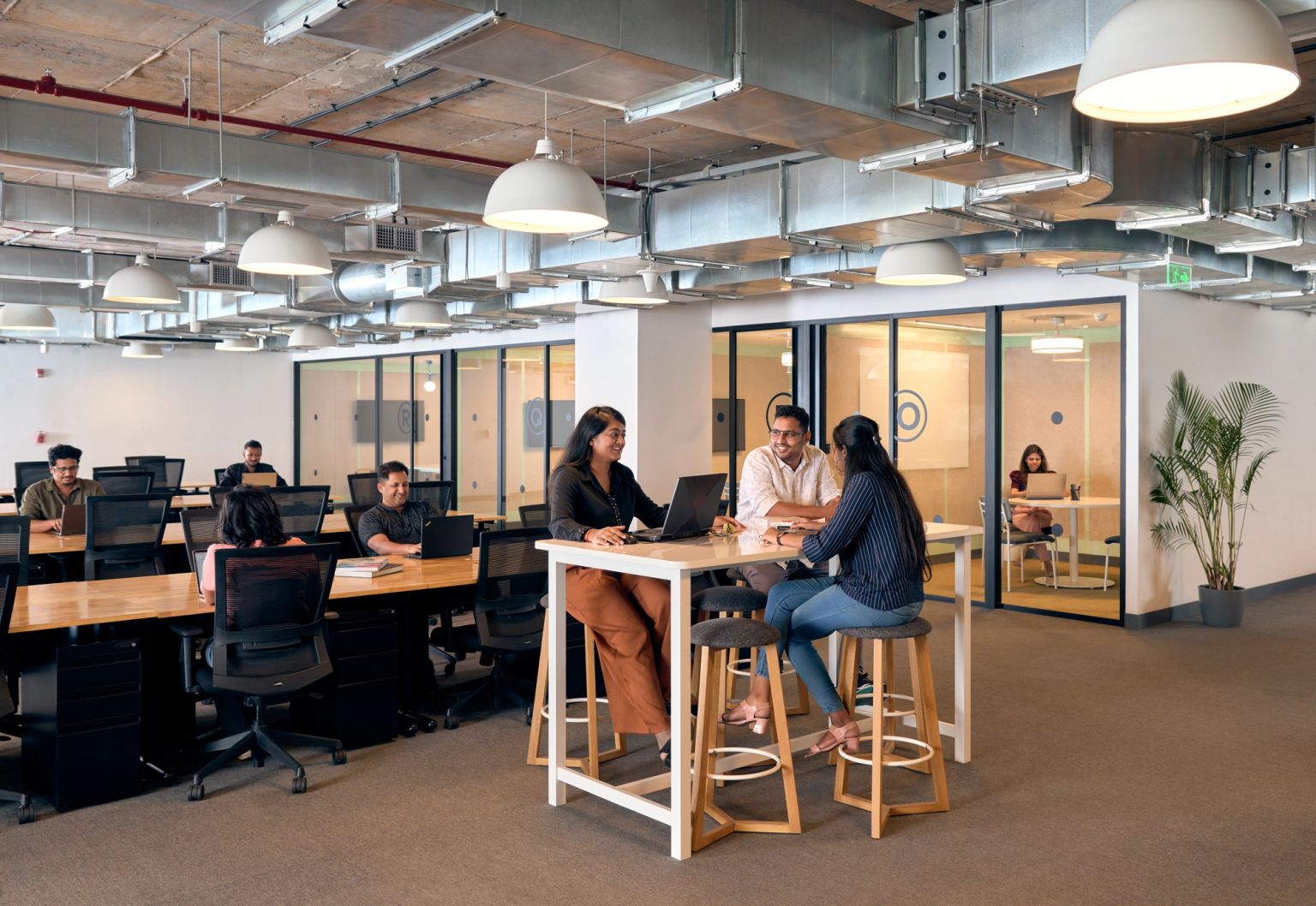CULTURE & COMMUNITY
Workplace Culture: The key to employee satisfaction and business success

Learn the importance of workplace culture and despite the diversity in the workplace how to create a great workplace environment for your employees with Wework.
As workplaces evolve globally, fostering a positive and inclusive workplace culture becomes crucial for the success and growth of companies. Let's delve into why workplace culture is important and how it impacts various aspects of an organisation.
So, what's workplace culture all about?
Workplace culture encompasses the values, beliefs, attitudes, and behaviours shared by a company. The way people interact and work together in a business is shaped by its social and psychological environment. This company culture creates the atmosphere in the workplace, deeply affecting team happiness, productivity, and the overall success of the organisation.
Why is workplace culture important?
Employee satisfaction and retention:
A positive workplace culture promotes job satisfaction, which in turn reduces turnover rates. When employees feel valued and respected, they are more likely to stay with the company, contributing to its stability and growth. Workplaces that foster a sense of belonging and respect see higher retention rates.
Productivity and performance:
An engaging workplace environment fosters collaboration and boosts productivity. Employees who align with the company culture are more enthusiastic about their roles, leading to higher performance levels. A positive culture encourages employees to go above and beyond their job descriptions, contributing creatively and energetically to the company's goals.
Hiring talent:
Prospective employees often consider workplace culture before accepting job offers, seeking environments where they can thrive and feel a sense of belonging. Companies known for their excellent work culture become employers of choice, attracting highly skilled candidates.
Enhanced collaboration:
A strong workplace culture encourages teamwork and collaboration. When employees share common values and goals, they are more likely to work well together, sharing ideas and supporting each other. This collaborative spirit is vital for innovation and problem-solving.
The importance of cultural diversity in the workplace
Diverse teams bring a lot of different perspectives and ideas, driving innovation and creativity. Here’s why cultural diversity is important in the workplace:
Enhanced problem-solving:
Diverse teams approach problems from different angles, leading to more effective solutions. This diversity of thought is invaluable in today’s fast-paced business world. Leveraging these differences can lead to innovative solutions that might not emerge in a more homogenous group.
Broader market reach:
A culturally diverse workforce can better understand and cater to a diverse customer base, enhancing market reach and customer satisfaction. Employees from different backgrounds bring insights into various consumer preferences and behaviours, allowing companies to tailor their products and services more effectively.
Inclusive work environment:
Promoting cultural diversity fosters an inclusive environment where all employees feel respected and valued, regardless of their background. This inclusivity boosts morale and engagement across the board. Creating an inclusive workplace is crucial for harmony and productivity.
Innovation and creativity:
Diversity in the workplace encourages creative thinking and innovation. When people from varied backgrounds collaborate, they bring unique perspectives that can lead to groundbreaking ideas and solutions. This is particularly important in industries that rely on creativity and innovation for success.
Global competitiveness:
As companies increasingly operate on a global scale, having a culturally diverse workforce is a significant advantage. It enables better communication and understanding with international clients and partners, fostering stronger global relationships.
Why company culture is important
Company culture is the backbone of any successful organisation. Here are a few reasons why culture is important in the workplace:
Alignment with company goals:
A strong workplace culture aligns employees with the company’s mission and values, ensuring everyone works towards common goals. This alignment is particularly crucial in achieving long-term business objectives. When employees understand and believe in the company's mission, they are more likely to be committed and motivated to contribute to its success.
Adapting to change:
Companies with a robust workplace culture are better equipped to navigate changes and challenges. A cohesive culture provides a stable foundation during times of transition, helping employees adapt more readily. This is particularly important in a rapidly changing business environment, where companies must be agile and responsive.
Brand reputation:
The workplace culture significantly impacts a company’s brand and reputation. Companies known for their positive work environments attract customers, partners, and investors, contributing to overall success. A strong, positive culture can enhance a company's image and make it a preferred choice for clients and collaborators.
Employee engagement:
Engaged employees are more productive, loyal, and motivated. A strong company culture fosters engagement by creating a supportive and fulfilling work environment. Employees who feel engaged are more likely to contribute actively to the company's success and advocate for its interests.
Conflict resolution:
A positive workplace culture promotes open communication and trust among employees, which is essential for effective conflict resolution. When employees trust and respect each other, they can resolve conflicts more constructively, maintaining a harmonious work environment.
Strategies for building a positive workplace culture and employee satisfaction
Creating a positive workplace culture requires intentional effort and commitment from leadership. Here are some strategies for building a strong workplace culture:
Define and communicate core values:
Clearly define the core values that underpin your company culture and communicate them consistently. These values should guide decision-making and behaviour at all levels of the organisation.
Also Read: What will it take to end bias in the office?
Higher management must lead by example:
Leadership plays a crucial role in shaping workplace culture. Leaders should model the behaviours and attitudes they want to see in their employees, demonstrating commitment to the company’s values.
Foster inclusivity:
Promote diversity and inclusivity in the workplace by implementing policies and practices that support all employees, regardless of their background. This includes offering diversity training, having an office space that celebrates cultural events, and ensuring equal opportunities for all.
Also Read: Rethinking Workspaces
Encourage open communication:
Create an environment where employees feel comfortable sharing their ideas, feedback, and concerns. Open communication fosters trust and collaboration, which are essential for a positive workplace culture.
Recognise and reward employees:
Recognise and reward employees for their contributions and achievements. This can be through formal recognition programs, bonuses, or simply acknowledging their efforts in meetings and communications.
Support work-life balance:
Encourage a healthy work-life balance by offering flexible work arrangements where employees can opt to work from home or from a coworking space, promoting wellness initiatives, and respecting employees’ time outside of work. A balanced approach helps prevent burnout and promotes overall well-being.
Provide opportunities for growth:
Invest in employee development by offering training and career advancement opportunities. Employees who see a clear path for growth within the company are more likely to be engaged and committed.
Fostering a thriving workplace culture for long-term success
From enhancing employee satisfaction and productivity to promoting cultural diversity and aligning with business goals, a positive workplace environment is a cornerstone of organisational success. As companies continue to grow and evolve, fostering a strong, inclusive, and dynamic workplace culture will remain paramount in driving sustained growth and innovation.
By understanding why workplace culture is important and actively working to cultivate it, businesses can create thriving, productive, and harmonious environments where employees and the organisation as a whole can flourish. The emphasis on workplace culture offers unique opportunities to harness the power of diversity and create workplaces that are not only successful but also inclusive and enriching for all employees.
Related Blogs:

CULTURE & COMMUNITY
Many professionals now deal with stress regularly, with tight deadlines and long work hours in a stressful workplace. In such a demanding and fast-paced work culture, mindfulness can be an effective strategy.

CULTURE & COMMUNITY
A buddy system involves assigning a new employee a coworker buddy. The buddy, who is an experienced worker, guides the new employee for the first weeks or months of work.

